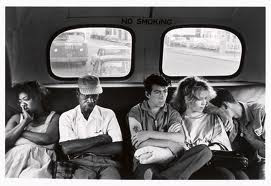2014 Brooklyn Non-Fiction Prize Finalist
Leaving (Brooklyn)
by
Josh Lefkowitz
The
driver helped me load the bags into the trunk, then pulled the car away from
the curb.
It’s like we’re pulling away from the curb
of my life, I thought to myself.
“It’s
like we’re pulling away from the curb of my life,” I said aloud to the driver.
“Huh?”
he said.
“Um,
nothing,” I replied.
“Where
to?” he asked.
“Queens,”
I said, “Sunnyside.”
We
drove in silence for a few blocks. I
watched Park Slope through the backseat window.
People were out in the street: walking their dogs, carrying
groceries. An irregular abundance of
couples strolled through the neighborhood, all of them holding hands with each
other, as if they had conspired the night before: Hey, tomorrow? Let’s make that
guy in the backseat of the car driving by feel as terrible as possible!
After
about five minutes, the driver spoke up: “Her fault or yours?”
“Neither,”
I replied, “it just wasn’t working anymore.”
“So,
yours,” the driver hypothesized.
It
was all those bags that had tipped him off, I’m sure. Two suitcases, plus several additional
garbage bags stuffed with clothes, books, a skillet, a cheese grater. Whatever I had thought to grab, in the
moments after she’d said, “you have to leave – you are not welcome here
anymore” and before the car had arrived.
Or
maybe it was my eyes that explained the situation: wide and wounded. Panicked.
Shell-shocked.
Or
my scent. What did a break-up smell
like, anyhow? Fear, I suppose.
“Love’s
a bitch,” said the driver, merging onto the BQE without warning and sans
turn-signal. How many members of broken
homes had he helped shuttle from one borough to another, I wondered. In this city of eight million, was I even the
first one today?
I
sat in the backseat, picked at my lip, and studied the shape of his
cranium. He seemed intelligent, or maybe
I just needed a father figure.
“What
do I do now?” I asked.
“That’s
easy,” he said, “you get laid. You go
fuck a girl and pretty soon you’ll forget all about this one.”
“I
just wasn’t going to marry her,” I explained.
“Why
not?”
“I
don’t know. Her work was always going to
come first. And I wasn’t happy a lot of
the time. She was pretty, though – and very kind.”
“She
sounds great,” said the driver, “has she got an older sister?”
We
resumed our silence, the car speeding along the highway. The city’s magnificent skyline twinkled to
the west.
“All
women are crazy,” said the driver after a while. It was the kind of grossly misogynistic
statement men are always making to each other in times of need; like watching
your team make a single errant pass and declaring, “These Knicks suck!” I said nothing in reply. Maybe I chuckled a little.
Then
I asked, “You ever been through something like this?”
“Please,”
he said, “When my wife died, I crawled inside the bottom of a bottle.”
“I’m
sorry,” I said, “how did she –”
“Car
crash,” he said, “1980. No, ’81. Afterwards, I showed up to work drunk. ‘Course my boss, he understood. His wife had died six months earlier. He gave me a week, said ‘if you’re like this
next Monday you’re gone.’ So I cleaned
up. A couple months later I met a girl –
long and droopy like a string bean.”
“Nice
image,” I said.
“Thanks. Anyways, I fucked her and that’s how I got
better.
“Look
at me,” he went on, “I’m a fat old man, and even I do alright. You’ll be fine.”
“Maybe,”
I said, then added, “I’m sorry I’m so wounded and raw.”
“That’s
okay,” he said, “you just don’t have any self-confidence. I knew a guy just like you once. Larry was his name. He’s dead now, but, still. Nice guy.
No self-confidence, though.”
We
pulled up to my friend’s apartment. I
already missed her, or so I believed. In
truth, maybe I just missed her apartment; or Brooklyn as my home borough, or
Brooklyn as an idea.
He
unloaded my bags, and set them down on the street alongside me.
“You’ll
be fine,” he repeated again.
“How
do you know?” I asked.
“I
don’t,” he said.
“Then
why’d you say it?” I asked.
He
squinted at me, cocked his head, scratched his side, hitched up his pants a
bit, shrugged, and got back in the car.
He switched the gear from park to drive, and was about to step on the
gas when he rolled down the window and said, “You know that old folk song ‘Hard
Times, Come Again No More?’”
“Yeah,
sure” I said, “it’s very pretty.”
“Well,
they always come again,” he said, “and singing that song doesn’t make a damn
difference either way. But we still sing
the song. Y’know what I mean?”
I
nodded my head. Car driver as prophet.
He
smiled. Then he said:
“Hey
do you know where there’s a public bathroom I could use around here? I gotta pinch a loaf.”
“Naw,
I don’t know” I said, “this isn’t my neighborhood. Sorry.”
“That’s
alright,” said the driver, “I’ll hold it,” and he stepped on the pedal and
drove away.
I
rang the buzzer to apartment 5F, but my best friend Jason wasn’t home yet. I dragged my bags over to a stone bench in
the courtyard, and sat down. It was
Easter Sunday.
I don’t know where I’m going to live, I
thought to myself.
“I
don’t know where I’m going to live,” I said aloud, to no one.
I
sat and stared at the fountain in the center of the courtyard. It was surrounded by flowers, pinks and blues
and yellows, all of which were beautiful this time of year.
Oh,
and the wind: the wind felt lovely against my exposed skin.

No comments:
Post a Comment